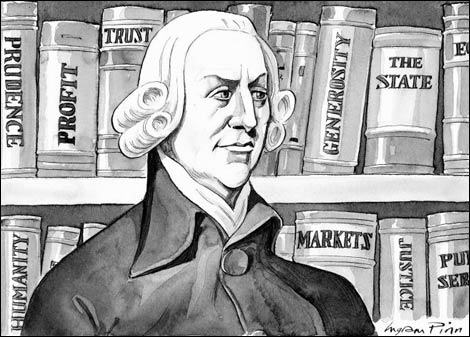 UNRAVELLING THE MYSTERY OF ADAM SMITH'S FOOTNOTES
UNRAVELLING THE MYSTERY OF ADAM SMITH'S FOOTNOTES"...une saine politique que le commerce amène toujours..." — Raynal
AM | @HDI1780
Adam Smith quotes Raynal in chapter 11 of the first book of the Wealth of Nations [see]. Presumably, the Scottish philosopher and economist was aware of Horace Walpole's mordant criticism of Histoire des deux Indes. This is why Raynal is presented as a "sometimes" well-informed author:
According to the eloquent and, sometimes, well-informed Author of the Philosophical and Political History of the establishment of the Europeans in the two Indies, the annual importation of registered gold and silver into Spain, at an average of eleven years; viz. from 1754 to 1764, both inclusive; amounted to 13,984,185¾ piastres of ten reals.
The footnotes related to HDI in the Edwin Cannan edition of the Wealth of Nations (1904) were not written by Adam Smith. They are all Cannan's notes. I am on the lookout for more references, and I think I have already found quite a few of them. Cannan thinks that Smith read the 1773 edition printed in Amsterdam:
NOUVELLE ÉDITION, CORRIGÉE,
& augmentée d'une Table des Matieres.
A AMSTERDAM
___ ___ ___ ___ ___ ___ ___ ___ ___
M. DCC. LXXIII.
This appears to make sense; as Smith biographer Nicholas Phillipson writes, "In the spring of 1773 Smith decided to end his Kirkcaldy retreat and to finish the Wealth of Nations in the capital. He needed company and American news" (*). Presumably, Smith bought his Histoire des deux Indes volumes in London, in May or June 1773. But keeping track of Cannan's footnotes is no easy task. One of the problems is the scarcity of Google Books volumes of the 1773 edition; so far I have only found versions of volume I [see] and volume II [see].
& & &
But there is another problem. Some of the references given by Cannan do not seem to match the content of the 1773 edition at all. One example that 'works' is the quote about Pope Alexander III in the second chapter of Book III:
The time and manner, however, in which so important a revolution was brought about is one of the most obscure points in modern history. The Church of Rome claims great merit in it; and it is certain that so early as the twelfth century, Alexander III. published a bull for the general emancipation of slaves. It seems, however, to have been rather a pious exhortation than a law to which exact obedience was required from the faithful.
Cannan's footnote reads: "...tom.1., p.12". But it isn't there! Rather, it is on page 18 [see]. One can find it, however, on page 12 of the 1772 edition [see]. In other words: Smith did not buy the 1773 edition! This is not a trivial discovery — it will simplify things quite a bit, because the 1772 version of Histoire des deux Indes is much easier to track with Google Books. So stay posted for much more news. Anyway, here's that passage on the Pope:
Il est vrai que le Pape Alexandre III déclara que des Chrétiens devoient être exempts de servitude ; mais il ne fit cette déclaration que pour plaire aux rois de France & d'Angleterre, qui vouloient abaisser leurs vassaux. La religion Chrétienne défend si peu la servitude, que dans l'Allemagne Catholique, en Bohême, en Pologne, pays très-catholiques, le peuple est encore esclave, sans que l'Eglise le trouve mauvais.
(*) Nicholas Phillipson. Adam Smith. An Enlightened Life. London: AllenLane, 2010, p. 209.
_________
No comments:
Post a Comment